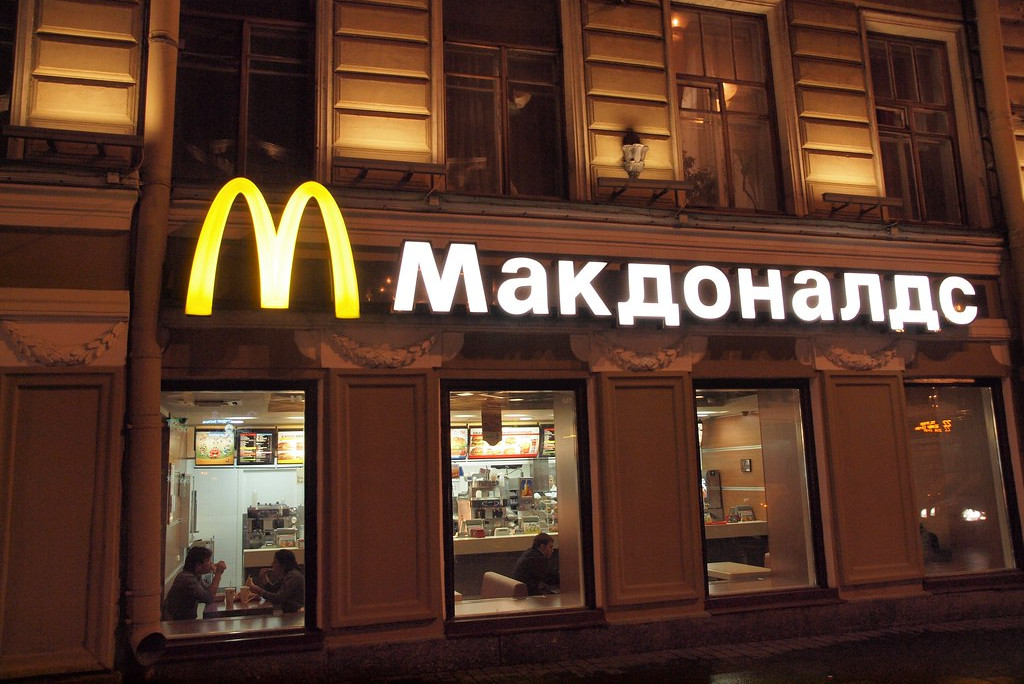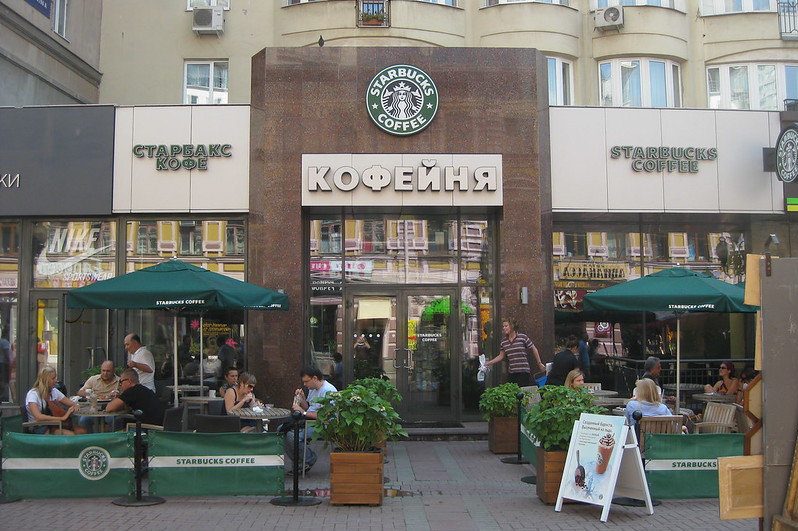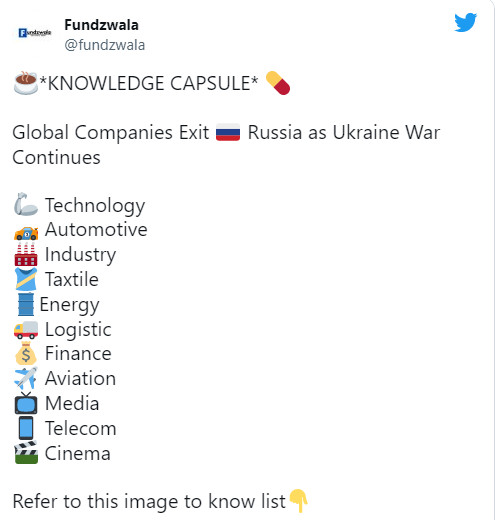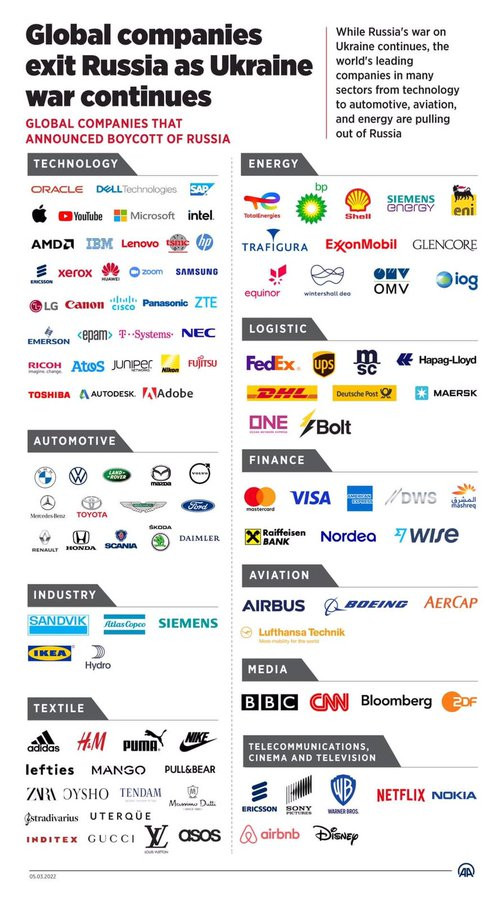
Date: 2025-12-31 Page is: DBtxt003.php txt00021852
THE WAR IN UKRAINE
SANCTIONS ... AND LINKS WITH THE FREE WORLD
What big companies have withdrawn from Russia? ... A strikingly large number of big companies are leaving Ukraine. Here's who is doing it and why it matters.
SANCTIONS ... AND LINKS WITH THE FREE WORLD
What big companies have withdrawn from Russia? ... A strikingly large number of big companies are leaving Ukraine. Here's who is doing it and why it matters.

Image credits: Sandra Cohen-Rose / Colin Rose
Original article: https://www.zmescience.com/science/news-science/what-big-companies-have-withdrawn-from-russia/
Burgess COMMENTARY
Right now (March 24, 2022) it is fashionable for companies to make anouncements about pulling out of Russia and not selling their products and services into Russia ... but the success of sanctions is going to be about how all these 'announcements' are actually implemented. There is also a wave of companies that are realizing that following through on their quick announcements is going to be a lot more difficult than simply making an announcement because of all sorts of legal responsibilities, not to mention the impact on their business performance which is going to be material and likely much bigger than the reputational value associated with their anti-Putin PR announcement. It is likely that investors will be much more interested in their own personal wealth than the longer run state of the world!!!!!!!
It would be interesting to see how many of the major professional firms that advise corporate organizations on their legal and other complex issues will start advising on how major companies can minimize the impact of sanctions. My guess is that the biggest and boldest will find a way of making big fees out of this and turn crisis into opportunity and the state of the world, be dammed!!!!!!!!
Peter Burgess
A strikingly large number of big companies are leaving Ukraine. Here's who is doing it and why it matters.
Written by Mihai Andrei
March 11, 2022
Russia’s invasion of Ukraine has caused a tectonic shift in the world order almost overnight. In addition to the war itself and the humanitarian crisis caused by the war, major economic shifts are now underway due to unprecedented economic sanctions cutting much of Russia’s economy from the world.
It’s not just governments that don’t want anything to do with Russia any longer — many companies are also withdrawing from Russia, many of which are huge consumer brands and corporations whose products and services virtually Russians were using on a daily basis.
Why are companies doing this
For some, it’s about taking a stand and doing the right thing. For others, it’s more of a PR move as they just don’t want the backlash from the international clients. However, it should be said that financial sanctions and curtailed imports also make it hard for companies to operate in Russia — so some may be leaving because they’d find it hard to do business there anyway.
Lastly, some companies who have announced that they’re leaving the country only had a small presence there, to begin with, so it’s mostly a token withdrawal. But others, like Apple and Volkswagen, made billions in revenue each year and decided to suspend their activity anyway, which shows just how far the line was crossed.
What big companies are leaving Russia
Energy companies
- Exxon Mobil said it will exit all its Russian oil and gas business, valued at more than $4 billion. All new investments cancelled.
- BP wants to exit its nearly 20% stake in Russian oil giant Rosneft, which may cost it as much as $25 billion.
- Shell is severing ties with Russian gas giant Gazprom and stopping its $1 billion financing of the Nord Stream 2 gas pipeline. Any profits from a recent purchase of Russian crude oil will be donated to aid Ukrainian refugees.
- Italian energy company Eni has suspended all new purchases of oil and oil products from Russia.
Food and drink companies

A Starbucks in Moscow. Image credits: Achim Hepp.
Russia’s people will now find themselves unable to consume many of the western products they had become accustomed to in recent decades.
- After great public pressure, McDonald’s announced the temporary closure of all of its stores in Russia. The company sees this as only a temporary closure and will continue paying its approximately 62,000 Russian employees during the pause in restaurant operations.
- Starbucks has suspended all its activity in Russia, noting that it will offer support to some of its 2,000 employees.
- Coca Cola has suspended its business in Russia, without adding too many details.
- Pepsi announced it is suspending the sales of their sodas in Russia. However, the company will continue to produce dairy and baby food products there, calling it a “humanitarian” effort.
- Yum Brands (the parent company of KFC and Pizza Hut) has stopped its activity and investment in Russia.
- Restaurant Brands International, the company behind Burger King, is ending support for its 800 locations operated by franchises in Russia.
- Carlsberg, the world’s third-largest beer company, said it will stop selling its beer in Russia. However, Carlsberg Group’s Baltika Breweries will continue to be run as a separate business. Carlsberg employs 8,400 people in Russia, and 13% of its revenue came from Russia and Ukraine.
- Heineken will also halt the sale of beer in Russia.
Big tech companies play a key role in sanctions imposed on Russia, and they’ve moved quite swiftly.
- Apple has announced it is limiting services such as Apple Pay in Russia and ceasing exports of its products to the country. In addition, Apple restricted features in Apple Maps in Ukraine to safeguard civilian safety.
- Google blocked all online advertising in Russia.
- IBM has suspended business in Russia.
- Sony has stopped the sale of consoles in Russia.
- Microsoft has suspended the sale of its products to Russia.
- Dell stopped selling its products in Russia.
- Ericsson has suspended deliveries to Russia.
- Amazon Web Services will no longer be accepting new clients from Russia and Belarus.
- Oracle says it has ceased operations in Russia.
- Software company SAP has suspended operations in Russia.
- Nintendo also halted its sales to Russia.
- Ericsson is suspending deliveries to Russia.


Transportation companies
- Airbus will no longer provide parts and services to Russia.
- Boeing will also block the sale of parts and services to Russia. Boeing has also sopped buying titanium from Russia.
- GM halts sale of cars to Russia and Belarus (a market of only ~3000 cars / year).
- Ford is suspending operations in Russia.
- Volkswagen has only paused delivery of Audis already in Russia so it can adjust car prices to adjust to the decline of the ruble.
- Renault ceased operations and production at two assembly plants because it can’t get parts.
- DHL, FedEx, and UPS have suspended shipments to and from Russia and Belarus.
- Volvo Cars (owned by Chinese company Zhejiang Geely) has also halted sales and shipments.
- Harley Davidson has suspended shipments to Russia.
- Stellantis, the comapny which makes Jeep, Fiat and Peugeot vehicles, has suspended imports and exports to Russia.
- Nike has only ceased online sales because it can’t guarantee delivery.
- Adidas, a staple company in Russia, will shut its stores.
- Uniqlo took a U-turn and said it would suspend its operations in Russia, after its chief executive, Tadashi Yanai, said that its stores would continue selling clothes in Russia.
- TJX, the company behind owner of T.J. Maxx, T.K. Maxx, and Marshalls, will divest its equity ownership in Familia, a retailer with more than 400 stores in Russia.
- Hermès has temporarily closed all of its stores in Russia.
- Hugo Boss is halting all its activities in Russia.
- The “big four” accounting firms have all withdrawn from Russia, signaling a clear financial exodus.
- PricewaterhouseCoopers announced it is cutting ties with its Russian member. The company noted that while they are working with PwC Russia to undertake “an orderly transition for the business”, their main focus is to “help our Ukrainian colleagues and support the humanitarian efforts to aid the people of Ukraine who have been devastated by this invasion”.
- Deloitte said it “will no longer operate in Russia and Belarus,” separating the practice in the two countries from the global network of firms.
- KPMG announced it is ending its association with its 4,500 partners and staff in Russia and Belarus.
- Ernst & Young also severed its ties with Russia, ending the 4,700-person business in the country.
- Western Union has ceased its operations in Russia and Belarus.
- Goldman Sachs was one of the first companies to announce it is leaving Russia, saying that it “is winding down its business in Russia in compliance with regulatory and licensing requirements.”
- Just hours after Goldman Sachs’ announcement, JPMorgan Chase, the largest bank in the United States, followed suit.
- American Express, Mastercard and Visa have partly suspended operations in Russia. Cards issued in Russian will not work elsewhere, and cards issued elsewhere will not work in Russia.
- Unilever says it will block both imports and exports to and from Russia.
- Ikea announced no more imports or exports in Russia, but Ikea will continue to operate its major chain of shopping centers, Mega.
- Estée Lauder announced it is suspending “all commercial activity in Russia.
- Netflix has suspended all serivce in the country.
- Spotify’s paid subscription will no longer be available in Russa, but the free service will continue.
- Disney also paused all of its business in the country.
- Japanese industrial company Hitachi has suspended business in Russia.
- Top designer companies, including Prada, Gucci, and Dior are shutting their doors in Russia as well.
-----------------------------
Written by Mihai Andrei ... Mihai Andrei's background is in geophysics, and he's been fascinated by it ever since he was a child. Feeling that there is a gap between scientists and the general audience, he started ZME Science -- and the results are what you see today.
We recommend
- Russia’s war: Why The BMJ opposes an academic boycott
- Kamran Abbasi et al., The BMJ, 2022
- Full invasion may follow Russian moves on east Ukraine
- Ukraine war creates new challenges for tech companies
- A New Look at Intravenous Platelet Inhibitors in the Cath Lab